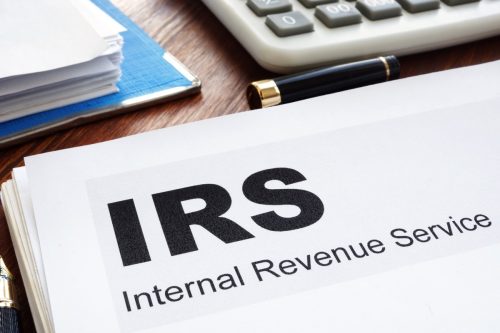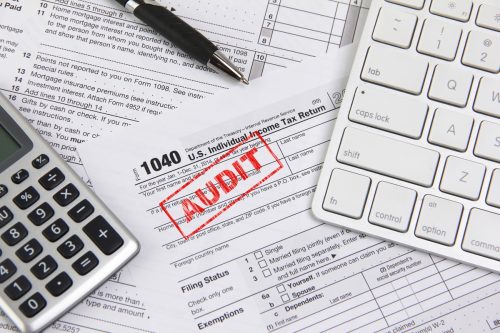IRS Warns Taxpayers About “Deeply Troubling” Credits That Could Get Them Audited

Tax season can be one of the most stressful times of the year. With complex laws and ever-changing codes, filing a return remains a confusing process year after year. But the stakes are high to get things right. The Internal Revenue Service (IRS) can choose to audit any taxpayer, and mistakes found on your tax returns can trigger penalties or even jail time in certain cases. Now, the agency is sounding the alarm about a new problem that could make you more likely to get audited. Read on to find out why the IRS is warning about “deeply troubling” credits.
READ THIS NEXT: The No. 1 Reason You Could Get Audited by the IRS, Experts Warn.
A new credit program was implemented at the start of the pandemic.

With the passage of the Coronavirus Aid, Relief, and Economic Security (CARES) Act in 2020, Congress created a new benefit program for taxpayers: the Employee Retention Credit (ERC). The ERC was introduced with the goal of incentivizing employers to “keep employees on their payroll despite experiencing an economic hardship related to COVID-19” by making them eligible for new credits.
Employers can claim credits for qualified wages paid in 2020 and the first three quarters of 2021, according to accounting firm Cherry Bekaert. “The ERC is a refundable payroll tax credit that can be as high as $5,000 per employee in 2020 and as high as $21,000 per employee in 2021,” the firm explains on its website.
The IRS is sounding the alarm on scams surrounding ERCs.

In a March 20 press release, the IRS announced that it had added Employee Retention Credit schemes as a “new entry” to this year’s Dirty Dozen list. Representing the “worst of the worst tax scams,” the list is compiled annually and features a variety of common scams that taxpayers may encounter—especially when seeking outside help during the filing season.
“For the start of the annual Dirty Dozen list of tax scams, the IRS spotlighted Employee Retention Credits following blatant attempts by promoters to con ineligible people to claim the credit,” the agency said in its new release, adding that it had already released several prior alerts about this issue.
According to the IRS, scammers are promoting ERC schemes by “blasting ads on radio and the internet touting refunds” from these credits. “These promotions can be based on inaccurate information related to eligibility for and computation of the credit,” the agency warned.
RELATED: For more up-to-date information, sign up for our daily newsletter.
The IRS Commissioner said this is “deeply troubling.”

Many of those actually eligible for the ERC have already claimed and received their credits, according to the IRS. Despite this, some promoters are still pushing widespread ads that are likely targeting taxpayers who aren’t actually eligible.
“The aggressive marketing of these credits is deeply troubling and a major concern for the IRS,” IRS Commissioner Danny Werfel said in a statement.
Werfel added, “While the credit has provided a financial lifeline to millions of businesses, there are promoters misleading people and businesses into thinking they can claim these credits. There are very specific guidelines around these pandemic-era credits; they are not available to just anyone.”
According to the IRS, the third-party promoters pushing the ERC often fail to accurately explain eligibility requirements for this credit.
“They may make broad arguments suggesting that all employers are eligible without evaluating an employer’s individual circumstances,” the agency explained. “For example, only recovery startup businesses are eligible for the ERC in the fourth quarter of 2021, but these third-party promoters fail to explain this limitation. In addition, some third parties do not inform employers that they cannot claim the ERC on wages that were reported as payroll costs in obtaining Paycheck Protection Program loan forgiveness.”
You can get audited for claiming these credits.

The IRS stressed the importance of taxpayers being aware that the ERC is not available to non-employers. But even employers “need to think twice before filing a claim for these credits,” Werfel said, noting that “businesses should be wary of advertised schemes and direct solicitations promising tax savings that are too good to be true.”
Taxpayers are solely responsible for any of the information reported on their own tax returns at the end of the day. And the IRS is increasing enforcement action surrounding ERCs on returns, according to the new press release.
“People should remember the IRS is actively auditing and conducting criminal investigations related to these false claims,” Werfel warned. “We urge honest taxpayers not to be caught up in these schemes.”
The IRS said its Small Business/Self-Employed division has trained auditors to examine these types of claims, and the agency’s Criminal Investigation Division is on high alert for promoters making fraudulent claims about ERCs. If you knowingly filed false or fraudulent tax forms to apply for this credit, you could be hit with “serious civil and criminal penalties,” the IRS said.
But even falling victim to a con artist’s ERC scheme could have serious consequences. “Improperly claiming this credit could result in taxpayers having to repay the credit along with potential penalties and interest,” Werfel warned.
Best Life offers the most up-to-date financial information from top experts and the latest news and research, but our content is not meant to be a substitute for professional guidance. When it comes to the money you’re spending, saving, or investing, always consult your financial advisor directly.